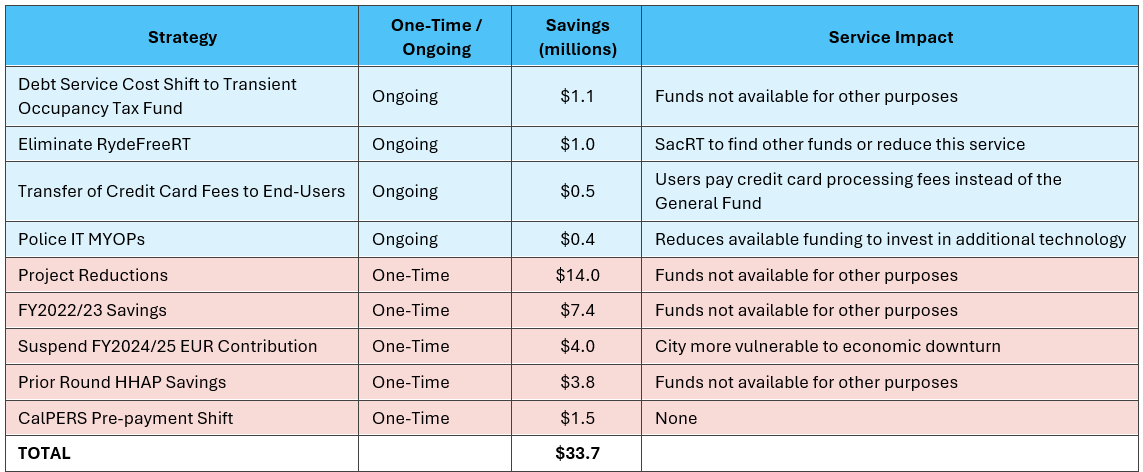City of Sacramento releases proposed budget for fiscal year 2024/25
Sacramento (April 30, 2024) - The City of Sacramento has released its proposed budget for fiscal year 2024/25, which represents the City’s financial plan for the upcoming fiscal year starting July 1.
The budget totals approximately $1.6 billion for operations and capital improvement projects. It supports 5,029 full-time-equivalent positions and is balanced.
Reflecting input from the City Council, City staff and the public, the proposed budget addresses the City’s projected $66 million deficit through a combination of strategies including revenue enhancements, prior-year savings, and expenditure reductions that largely eliminate vacancies and have a low or moderate impact to residents and communities.
The proposed budget does not contain the elimination of any filled City positions.
“The City Manager’s proposed budget is the product of months of challenging internal discussions and public workshops,” said Mayor Steinberg. “It represents a good start. His proposal avoids layoffs, and major service cuts. The council will now consider all the options and tradeoffs with a commitment to delivering a timely and balanced city budget. ”
City Manager Howard Chan expressed his commitment to a thoughtful approach in balancing the city budget.
“It has always been my goal to balance the budget by making strategic decisions instead of across-the-board cuts and to minimize – to the greatest extent possible – any impacts to core City service and City employees. I would like to thank the City’s Finance Team and City departmental staff for their tireless work in identifying and evaluating potential revenue enhancements and expenditure reductions. In my eight years as City Manager, this has been by far the most dynamic budget to develop,” said Chan.
The proposed budget maintains funding for key priorities such as homelessness and includes:
Continued operation of 1,350 shelter spaces/beds.
Continued staffing for the City’s Incident Management Team responding to homelessness.
Continued funding for the Affordable Housing Fee Credit program.
The proposed budget overview is scheduled for May 7 for both the Budget and Audit Committee and the City Council. Budget hearing meetings will continue throughout May. The Council will adopt a final budget in June.
Here is additional information about the proposed budget:
SUMMARY:
The Proposed FY2024/25 Budget recommends a balanced $1.57 billion spending plan for City programs and services and supports a workforce of more than 5,000 employees. It closes a $66 million funding gap without the elimination of any filled positions and reflects input provided by the City Council, City departments and the public.
FINANCIAL CHALLENGES:
The City is facing significant financial challenges for the coming fiscal year, including a structural imbalance between City operating costs and available resources. Unfunded pension liabilities and substantial unfunded capital needs are also contributing to the City’s ongoing economic uncertainty. The Proposed FY2024/25 Budget begins to address these structural issues while maintaining core City services and advancing Council priorities.
ADDRESSING THE DEFICIT:
In February, the City released its updated financial forecast, which projected a $66 million deficit for FY2024/25. The forecast showed the City is facing a structural deficit with annual budget shortfalls increasing throughout the forecast period.
The proposed budget seeks to address the City’s structural deficit by defining core City services and taking a strategic approach to revenue enhancements and expenditure reductions instead of simply pursuing across-the-board cuts.
City departments earlier this spring submitted potential revenue enhancements and expenditure reductions that totaled 15% of their General Fund/Measure U discretionary funding. The 246 strategies were categorized on a 1- 4 scale based on impact to residents and communities, with Level 1 resulting in low impact to programs and services and Level 4 resulting in severe impact.
CLOSING THE GAP:
Overall, the proposed budget addresses the $66 million deficit through a combination of:
Revenue enhancements
Prior year savings
Some Level 1 and 2 expenditure reductions
Other citywide reduction strategies
The balancing plan in the proposed budget eliminates 44.20 vacant FTEs but does not eliminate any filled positions.
STRATEGIC REDUCTIONS:
A complete list of all proposed expenditure reductions can be found in the proposed budget. The proposed Level 1 and 2 reductions affect departments citywide and largely involve eliminating vacancies with the goal of minimizing — to the extent possible — program and service impacts to the community.
Cost savings also are realized by shifting the funding of programs and services from the General Fund to other available funding sources and rightsizing all department budgets to actual expenditures. In addition, here is the list of other citywide reduction strategies utilized to balance the Proposed Budget totaling $33.7 million.
ONE-TIME VS. ONGOING:
In closing the $66 million deficit, the Proposed Budget identifies $36.6 million in one-time strategies and $30.1 million in ongoing strategies. One-time strategies will need to be covered in the following fiscal year.
LONG-TERM CHALLENGES:
In addition to its structural operating budget deficit, the City has long-term unfunded liabilities, including unfunded capital and deferred maintenance needs, unfunded pension liabilities and unfunded retiree health benefit liabilities.
$1.4 Billion – Unfunded capital/deferred maintenance over next five years
$1.4 Billion – Unfunded pension liability
$0.2 Billion – Unfunded retiree other post-employment benefits (OPEB)
The City will need to develop funding policies and plans to close these deficits over time.
BUDGET HEARING SCHEDULE:










